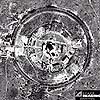| . |  |
. |
New Delhi (AFP) Dec 28, 2001 India and Pakistan hunkered down Friday for a protracted South Asian "Cold War" with harsh diplomatic sanctions in place and their armed forces staring each other down on the border. The regional crisis stemming from the December 13 terror attack on the Indian parliament deepened Thursday as India announced a ban on Pakistan airlines using its airspace and a 50 percent cut in embassy staff in both countries. Pakistan swiftly responded with reciprocal measures. The turning of diplomatic screws triggered fresh expressions of concern from around the globe, with the United States telling both countries that their rapidly escalating standoff could detract from its war on terrorism. "This is something we're keeping our eye on very carefully, and we have clearly made the interests we have in this subject known to both sides very carefully and with clarity," said US Defense Secretary Donald Rumsfeld. Rumsfeld alluded to concerns that Pakistan may be forced to redeploy manpower from its border with Afghanistan -- where scores of troops are hunting terror suspect Osama bin Laden and his supporters. British Foreign Secretary Jack Straw said he was "deeply concerned" and called on both countries to "work together to resolve their differences" -- an appeal echoed in a statement released by the The Group of Eight (G8) industrialised nations. But Indian Home Minister L.K. Advani made it clear Friday that New Delhi would pursue its objectives with or without international approval. "Let the world support us. If they do not support us then that is all right too," Advani said at a paramilitary police function. Later Friday, the Press Trust of India quoted Advani as saying: "India's struggle against terrorism has entered into a decisive phase after the December 13 attack on parliament." Advani also said New Delhi does not have much hope of Pakistan distancing itself from Muslim guerrilla groups, which India describes as terrorist organisations. India says the attack was backed by Pakistani intelligence and has demanded that Islamabad take action to shut down two Pakistan-based Kashmiri militant groups it accuses of carrying out the operation which left 14 people dead. Advani and Defence Minister George Fernandes are likely to visit the United States in mid-January as part of a diplomatic offensive to mobilise world opinion against Pakistan. Foreign Minister Jaswant Singh, his deputy, Omar Abdullah, and National Security Advisor Brajesh Mishra are expected to visit other capitals and Prime Minister Atal Behari Vajpayee has given the go ahead for groups of all-party MPs to go on similar tours. The sabre-rattling coincided with a bout of artillery duel which left a child dead and one soldier injured in Indian Kashmir on Friday, a military spokesman in New Delhi said. The tit-for-tat sanctions announced Thursday prompted grim headlines in Indian newspapers. "Delhi Declares Cold War" was the front page banner in the Asian Age, echoed by the Indian Express with "Cold War Heats Up." India withdrew its envoy from Islamabad last week and snapped cross-border rail and bus links. With the second round of sanctions, New Delhi has used up much of the weaponry in its diplomatic arsenal, but analysts said it could still opt to abrogate a water sharing treaty over the Indus River -- a drastic step that would badly affect Pakistan. Announcing the sanctions on Thursday, Singh refused to specify a bottom line for Pakistani compliance with New Delhi's demands for a crackdown on the Lashkar-e-Taiba and Jaish-e-Mohammad militant groups. He described the actions announced by Islamabad so far as a series of "cosmetic measures, half-measures and even fictitious incidents." Meanwhile, India said it would grant Pakistan President Pervez Musharraf special dispensation to fly through its air space to attend next week's South Asian leadership summit in Nepal. "If a request was made by the president... India would grant permission," Foreign Ministry spokeswoman Nirupama Rao said. Musharraf has offered to hold talks with Vajpayee on the sidelines of the summit, but India has firmly rejected the idea.
Related Links  Islamabad (AFP) Dec 28, 2001
Islamabad (AFP) Dec 28, 2001Only a "diplomatic miracle" can avert looming war between Pakistan and India, analysts said Friday as the two nuclear-armed rivals remained locked in an eyeball-to-eyeball confrontation on the border. |
|
| The content herein, unless otherwise known to be public domain, are Copyright 1995-2006 - SpaceDaily.AFP and UPI Wire Stories are copyright Agence France-Presse and United Press International. ESA PortalReports are copyright European Space Agency. All NASA sourced material is public domain. Additionalcopyrights may apply in whole or part to other bona fide parties. Advertising does not imply endorsement,agreement or approval of any opinions, statements or information provided by SpaceDaily on any Web page published or hosted by SpaceDaily. Privacy Statement |